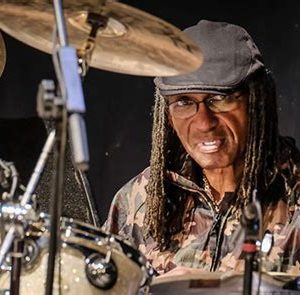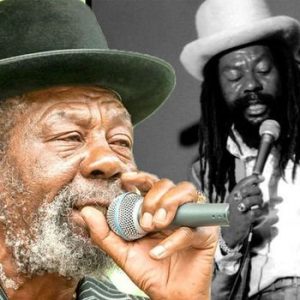https://unitedreggae.com/articles/n840/022412/interview-u-brown
By Angus Taylor on Friday, February 24, 2012
Born Huford Brown in 1956 in Kingston the young U Brown,he was exposed to music via his father. Along with many deejays in the late 1960s and early 1970s he was inspired to take up the microphone by the great U-Roy. But for U-Brown, as his name might suggest, the connection to U-Roy was deeper than just musical influence – he views it as nothing less than his spiritual calling in life. And again like Ranking Joe, he decided to combine his deejaying work with production – having been encouraged to start his Hit Sound imprint by local sonic entrepreneur Bunny Lee. 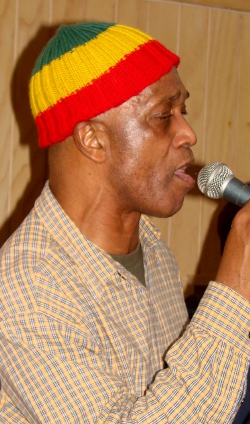
How did you get into music?
I originally loved music even as a kid but I couldn’t identify if I should dance, sing, deejay or select a sound. So by going out with my dad, when he was having a drink with his friends and listening to the music I started to identify the things that I loved. Fortunately for me I moved from Western Kingston, two doors above Treasure Isle studio, which was the first place where I saw people like Tommy McCook and Winston Wright, Wire Lindo, and Jackie Jackson the bass player. I moved to Kingston 11, not exactly Waterhouse but the next community called Tower Hill, which was between Cockburn Pen and Waterhouse, an adjoining community.
That was where you got involved in sound system?
I was so lucky that, at that time, you had King Tubbys, the number one roots rock rub a dub sound, and you had the master deejay Ewart Beckford, known to the world as U-Roy. I started to identify things within myself that were in U-Roy. U-Roy always played King Tubbys sound but occasionally he had a friend called Kentone which was a small sound that came from Cockburn Pen. So while I’d still sometimes go to dance, the impression I got from U-Roy and the vibes that I’d feel made me feel connected. So that’s where I started out in the dancehall business by repeat-singing his songs, like Wear You To The Ball, This Station Rule The Nation, and my friends started to recognize that my voice sounds close to U-Roy. So sometimes we’d go to a little sound close by and when they played the flipside, I would be standing by the soundbox singing things into my friends’ ears. My friends would be saying “Gwaan take the mic, take the microphone” but I was very shy as a young boy. Until finally one Wednesday evening, I remember it was in Phillip Avenue, Kingston 11, I went and took the mic. The name of the sound system was Silver Bullet – pull it and full it! (laughs)
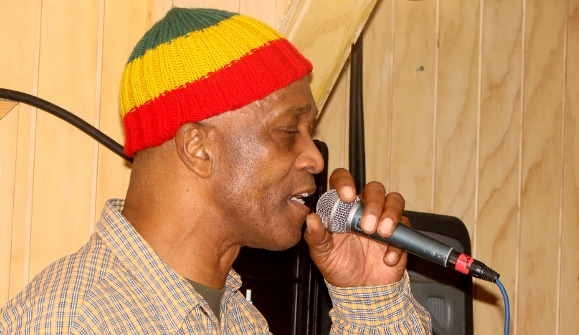
You got your first break on Tubbys sound when U-Roy had a road accident.
After deejaying on Silver Bullet, a small community sound, I got another chance to deejay with another bigger sound that was called Sounds Of Music. The owner was Phillip Munroe, who is the father of Macka Diamond, so Macka Diamond was born with music inside her. Then from Sounds Of Music I got the break with King Tubby because U-Roy met an accident and fractured his leg. And I Roy, Roy Reid, was also a very good deejay at the time, what they call man of the moment in the spotlight, he was travelling back and forth all over Jamaica so he couldn’t be the resident deejay. Because in those days every sound system in Jamaica had a resident deejay. If you wanted to hear Big Youth or Jah Youth, you had to go to Emperor Lord Tippertone, and if you wanted to hear U-Roy you had to go King Tubbys, and if you wanted to hear I Roy you had to go to Ruddy’s. I knew a guy Trevor, who we called Tower Hill because he lived on Tower Avenue in Tower Hill, that worked with King Tubbys and took care of the sound while he was on the road. He said to Tubbys that he knew a little ‘prentice and Tubbys who gave me the ok, so that’s where I got my real big first break on a real known sound system.
How did you get to make your first recording?
U BrownMy first recording was for a producer called Winston Edwards. There were two songs I recorded for him, Jamaican Tobacco and Wet Up Your Pants Foot. Then my third song was for the late Vivian Jackson, known to the world as Yabby You, which was called Dem A Wolf. He sang the vocal [Anti Christ] saying some people are sheep but when you check them out they are wolves – and I did a version that. Then I started to record for the great Striker Lee himself.
How did you link with him?
Bunny Lee was a resident producer in King Tubbys studio where he mixed most of his tracks. So as a young apprentice playing on King Tubbys sound, they were impressed by what I was doing. Bunny Lee then asked me to do some recording and I gladly did so. Because at the time when we were singing, we weren’t talking about money – the main thing was to get your voice playing on the radio. When you were in the community and a song came on the radio and everybody recognized your voice – that was the joy. It wasn’t like today. We never understood the business part of it, we just loved the music as the music. Because, I’m going to be honest, having been in the business over thirty years, if you asked me in ’68, ’69, when I started playing on a little sound system, I could not tell you that this music would take me to places like Reggae Jam and Summerjam in Germany.
We never understood the business part of it, we just loved the music as the music
So would you say U-Roy was the catalyst for your career?
I have to give thanks to U-Roy because everyone is connected with someone out there but some of us don’t take time out to find that person that you are connected with spiritually. I’m glad that U-Roy was living in the same neighbourhood at the time. There would not be a week that would pass when I would not see U-Roy, unless he was travelling. U-Roy would pass, in those days we were riding pedal bikes, before motorcycles, and I’d see him one time each week. And every time I’d see him I’d just admire not only his music but his principles, the way he’d conduct himself. I’ve known U-Roy for over thirty odd years and I’ve never heard U-Roy enter into an argument with anyone. If he disagreed with something he would say no, he’s not doing it. But no argument or fight or anything, he is my mentor so respect to him always.
Did you take your name from him, as is often reported?
No. Because U-Roy was born Ewart Beckford and how I understand he got the name, if I’m right, is one of his cousins was trying to call him Ewart but couldn’t pronounce the name. So he would say “Ew-woy!” and the name just stuck. But I was born as Huford Benjamin Brown and because of the deejaying some people called me U-Brown but some people still called me Hugh Brown from when I was younger.
You talked about Gregory Isaacs on stage today. You knew him well.
I knew Gregory very well, for over twenty years, from when I first started in the business. I knew him from the days of Orange Street in about 1974 when most of us were usually down there at Bunny Lee’s record shop, Niney The Observer’s record shop, and Gregory Isaacs had his office on Orange Street, for Progressive, one of his first labels.
Tell me about how you started producing and releasing your own material.
It was Bunny Lee again, give thanks for him. Because while I was around Bunny Lee, they had a saying in Jamaica “You have to show a man how to fish”. Bunny Lee opened my eyes saying “Yes, you are an artist who can record songs but you must also try to learn something about the business and it will become more interesting”. My first rhythm track that I produced I didn’t make. It was from Bunny Lee from a Barry Brown song [Mr Money Man] where I did a version called Badness A Madness. I gave that to Federal Records to release. And if you can find that record you will see that was the first time I tried to design a label, called Hit Sound. I couldn’t even afford to pay for the art work so we had to do the basic and just draw up the letters across, instead of making a design, because I was just a young youth coming into the business.
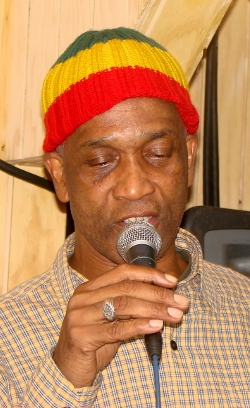
But you weren’t discouraged…
I was lucky again because Bunny Lee got me a trip to London to perform and when I came back I had a little money and decided to go further into producing. I came to realize that no matter how good an artist is or whatever product [you sell] is, it’s not every day that people are going to buy that product. But as long as you have experience in what you’re doing then you can invest so food will always be on the table. So I went in the studio and I tried to produce two tracks. These were the first two tracks I really spent my money on to call musicians and they were Weather Balloon and a remake of Dennis Brown’s Perhaps, sung by Al Campbell, the first he did for me.
Tell me about your version to Take 5 called Blow Mr Hornsman – which has inspired remakes from Welton Irie’s cut shortly after yours through to Tippa Irie’s new cut of it which he performed at Reggae Jam 2010.
I had a good friend named Chester Synmoie, who was also a producer. He is the one that gave Lone Ranger his first hit song Barnabas. He had that rhythm and came and asked me to do a track on it. It was an instrumental he laid called Take 5 (or Russians Are Coming) and when I heard that [Saxophone] the lyrics just came to my mind spontaneously and I just recorded it. Because I was like the Beenie Man or the Elephant Man at that time. But back in those times when you told people you were a deejay, not even your parents wanted you to be a deejay because they thought it wasn’t reaching anywhere as a young person growing up. When the police used to come to stop the dances and ask the deejay his name and you would say “U-Brown” they would swear at you and tell you to go home. So like I was saying to you before, I never expected the music to take me to these places. I was doing it for the joy of it. And because the joy of the music connected with another part of the world the people love it and that’s why I’m here today.
Finally tell me about yourself and the younger deejay Prezident Brown, your partner on this tour.
Well me and Prezident Brown, our connection it happened spiritually, the same kind of connection as when I met U-Roy. Prezident Brown was a young youth born in Clarendon and growing up in St Mary and I was born in Kingston. At that time I was one of the men of the moment and he gravitated onto my music. His brother was also a big dance-fan of me and anywhere I deejayed his brother would come so he started to come and listen to me. He liked my style and he started to find a spiritual connection. And when I first met Prezident Brown I didn’t even know it was Prezident Brown I was talking to because he was just a humble youth like I was humble. The only reason he knew it was me was because I had started to get recorded and everyone knew it was U-Brown. So finally, a few years back, I came across him and we started to communicate more and spend more time around each other so day by day we found out that we have something in common. He’s a very easy humble genuine person like myself, we communicate like brothers and, up until this day, he is one of my best friends.
Post script :
After this interview was completed we got wind of a new U-Brown album called King Tubby’s archives – soon to be a limited edition released on the deejay’s own Hit Sound label. We contacted U-Brown again and he added the following:
“This album is recorded as a tribute to the late Osbourne Ruddock, known to the world for the roots rock reggae dub segment, and the enhancing of deejays selecting an deejaying on soundsystems, becoming international recording artists all over the world, including myself, and the legendary Daddy U-Roy.
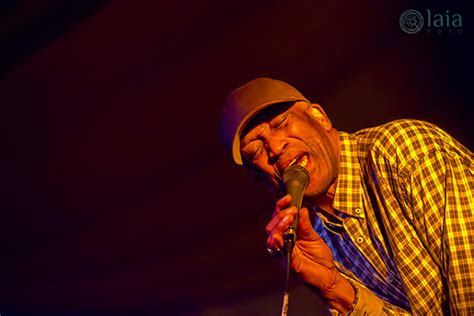
In his studio is where producer Bunny Lee recorded an mix some of his classical tracks with people like Johnny Clarke, Cornell Campbell, John Holt, the late great Delroy Wilson, myself U-Brown, U-Roy, I-Roy, Dillinger, Trinity, Jah Stitch, just to name a few.
So King Tubbys had a lot of great music coming out of his studio by recording an mixing for several producers, not to mention dub-music on dub-plates, before dub-plate specials came on the scene.
Everybody makes dub-album tributes to KING TUBBY’S which is good. But there was more than just dub coming out of King Tubby’s studio. So I had to bring some of these recordings from out of the archives of King Tubby’s.There are combination tracks with me U-Brown and Johnny Clarke, Cornell Campbell and Daniel Ray, an original roots rock rub-a-dub singer from back in the days of Jahlove Soundsystem with Brigadier Jerry plus straight tracks with myself. These tracks are dub versions of some of the classic vocal tracks produced by Bunny Lee, an mixed by King Tubby’s himself.”

